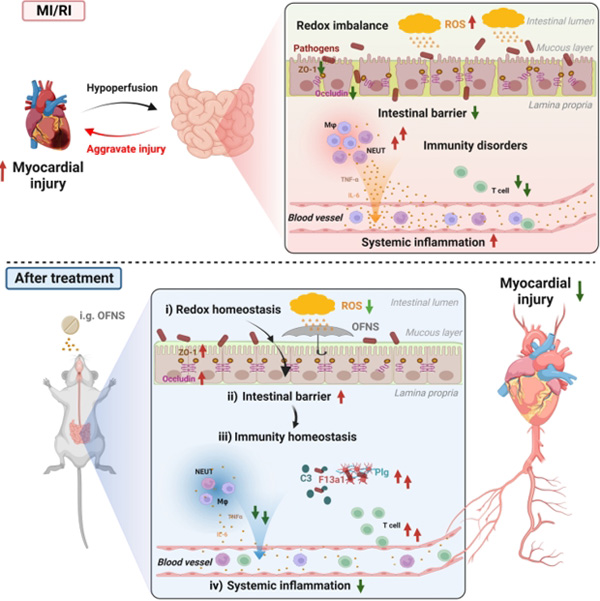Myocardial infarction (MI) is a deadly disease to threat human life world wide. MI could cause serious myocardial ischemic necrosis due to coronary occlusion. The most effective treatment for MI in clinic is reperfusion, e.g., interventional or thrombolytic therapy. However, reperfusion itself could induce more severe injury, called myocardial ischemia/reperfusion injury (MI/RI). Current therapies such as edaravone, allopurinol, and sodium nitroprusside, are not always satisfactory. Developing a new strategy to achieve a safe and effective treatment remains challenging.
Recently, Prof. BAI Chunli's and Prof. WANG Chunru's group from the Institute of Chemistry, Chinese Academy of Sciences (ICCAS) developed an oral therapeutic system using fullerene based reactive oxygen species (ROS) nanoscavenger (OFNS) that locally maintained intestinal redox homeostasis to reduce intestinal and systemic inflammation, thereby preventing against myocardial injury.
This study was published in Proceedings of the National Academy of Sciences of the United States of America on December 18, 2023.
The proposed strategy is based on the close relationship between the heart and the gut, as well as the excellent redox homeostasis regulation of fullerenes. In vitro, the researchers assessed the regulation effects of OFNS on cellular redox homeostasis in three kinds of cell models, including epithelial, endothelial, and inflammatory cells. In vivo, they confirmed the efficacy of OFNS in treating MI or MI/RI in mice and mini-pigs.
To verify the therapeutic mechanism, the researchers conducted the quantitative transcriptomics, proteomics, western blotting, immunostaining, flow cytometry, and so forth. The results suggested that OFNS modulated intestinal redox homeostasis and strengthened intestinal barrier integrity to relieve systemic inflammation and immune disorder for remote cardioprotection.
This work also provided a promising concept for tissue injury repair by focusing on small intestine immune axis, and shed light on the future therapy of inflammatory-driven injury in distal organs other than the heart.

The mechanism schematic diagram of OFNS on preventing myocardial injury in MI/RI mice. (Image by Wang Jia)
Contact:
Prof. BAI Chunli, Prof. Wang Chunru, Dr. Mingming Zhen
Institute of Chemistry, Chinese Academy of Sciences
Email: clbai@cas.cn, crwang@iccas.ac.cn, zhenmm@iccas.ac.cn